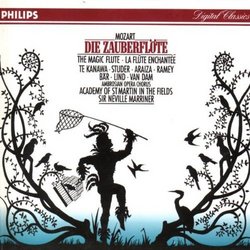| All Artists: Wolfgang Amadeus Mozart, Sir Neville Marriner, Academy of St. Martin-in-the-Fields, Kiri Te Kanawa, Cheryl Studer, Francisco Alaiza, Samuel Ramey, Olaf Bar, Eva Lind, José van Dam Title: Mozart - Die Zauberfl�te (The Magic Flute) / Araiza, Te Kanawa, Studer, Ramey, Lind, van Dam, B�r, Marriner Members Wishing: 1 Total Copies: 0 Label: Philips Release Date: 9/12/1990 Genre: Classical Styles: Opera & Classical Vocal, Historical Periods, Classical (c.1770-1830), Symphonies Number of Discs: 2 SwapaCD Credits: 2 UPCs: 028942627628, 028942627628 |
Search - Wolfgang Amadeus Mozart, Sir Neville Marriner, Academy of St. Martin-in-the-Fields :: Mozart - Die Zauberfl�te (The Magic Flute) / Araiza, Te Kanawa, Studer, Ramey, Lind, van Dam, B�r, Marriner
 | Wolfgang Amadeus Mozart, Sir Neville Marriner, Academy of St. Martin-in-the-Fields Mozart - Die Zauberfl�te (The Magic Flute) / Araiza, Te Kanawa, Studer, Ramey, Lind, van Dam, B�r, Marriner Genre: Classical
Neville Marriner and his orchestra, long-established experts in 18th-century music, are joined for this project by a smooth combination of veteran Mozartians who have recorded their roles before, and newcomers singing thei... more » |
Larger Image |
CD DetailsSynopsis
Amazon.com Neville Marriner and his orchestra, long-established experts in 18th-century music, are joined for this project by a smooth combination of veteran Mozartians who have recorded their roles before, and newcomers singing their parts for the first time on records. Three newcomers are familiar to opera fans from other work and slip easily into their roles: Olaf Baer (a superb Lieder singer) is an appealing Papageno, Cheryl Studer an impressive Queen of the Night and Samuel Ramey a monumental Sarastro. Kiri Te Kanawa and Francesco Araiza are veterans in their roles but manage to make the roles seem new. --Joe Mclellan Similarly Requested CDs
|
CD ReviewsThe starriest Zauberflote of all, but everyone's a bit off Santa Fe Listener | Santa Fe, NM USA | 07/03/2006 (3 out of 5 stars) "When this Magic Flute under Neville Marrienr was first released in 1990, even th Gramophone, usually the first to cheer for him and for Kiri Te Kanawa, was taken aback. Here is a cast full of stars, and yet everything seems strangely off. There are two major flaws. The first is the recorded sound, which is downright nasty, imparting a metallic edge even to the silken tones of Te Kanawa and Cheryl Studer. The second is Marriner, if he is responsible for the hard attacks that each singer uses, an aggressive style far from what we expect in Mozart. The whole cast sounds grouchy and serious except for Dame Kiri, who is passive and dreamy. That's quite a mismatch of styles, and it undermines the opera, which should have at least some warm, humorous, relaxed moments. Olaf Bar sounds strained and edgy in his upper range and has no humor at all for Papageno. Francisco Araiza matches him in shrillness and aggressive attack. Samuel Ramey's Sarastro is overly cautious, and he becomes hollow and wobbly in the lowest notes of the part, which are notoriously hard to control. Only the young Cheryl Studer, singing the Queen of the Night (an amazing feat for a future Salome and Elsa) makes you sit up and recognize a sterling effort. Marriner's basic interpretation is agreeable enough, if nothing inspired. In all, this should have been a serious contener for the best Magic Flute but wound up being a victim of crossed stars." What Mozart had in mind... Matt Mangialetti | Richmond, VA | 03/02/2005 (5 out of 5 stars) "I am soooo tired of reading reviews where everyone has to completely demean the singers (i.e., Cheryl Studer) This Zauberflöte is superbly cast. Kiri Te Kanawa is the only Pamina I can bear to listen to. Francisco Araiza is a somewhat sympathetic Tamino and sings well. Samuel Ramey is wonderful as Sarastro and Cheryl Studer is the ideal soprano for the Queen of the Night. As if Maria Callas, Cheryl Studer can possibly fall into the category of dramatic coloratura. Her voice is heavy and that's what Mozart would have wanted. She's also a great dramatist. Drama in opera is paired with the music. Ms. Studer makes a dramatic Queen of the Night. She's very convincing in her dialogue with Pamina and her singing. You can feel her pain as heartbroken mother and then later her venom as she gives Pamina the dagger. Everyone needs to remember that opera isn't just about beautiful singing, it's about the drama also. Opera is a total work of art and in this copy of Zauberflöte, the drama moves rightly along. I am 19 and this was my first opera recording at 13 years old. It remains one of my favorites and I recommend it to anyone." A Solid, If Not Perfect Recording Timothy Kearney | Hull, MA United States | 09/01/2006 (4 out of 5 stars) "Mozart's DIE ZAUBERFLOTE was the composer's last opera and has remained one of his most enduring works. Its plot is simple enough. The prince Tamino is on a journey. He sees a picture of the beautiful Pamina and is promised her hand in marriage by her mother, the Queen of the Night, that he if he rescues her from the evil Sarastro. Tamino sets out on his journey to rescue Pamina, armed with his magic flute. He is assisted by Papageno, who is also on a journey of love for his soul-mate Papagena. As they journey they discover that the Queen of the Night and not Sarastro is the evil one. The end of the opera has the two couples Tamino and Pamina and Papageno and Papagena united. Along the way they have a journey of self discovery. The themes of good v. evil, light and darkness, the search for love, and the surreal setting both is the past and present has led to all sorts of speculations as toy what the opera is truly about, but the mysterious setting and beautiful music has enchanted audiences for years.
This set has a number of credible performers. Kiri Te Kanawa's Pamina is probably the most consistent and involved performance on the set. I've always enjoyed tenor Francisco Araiza's voice. I'm not sure he ever received the recognition he deserves. Perhaps it's because his best known roles are not the powerhouse roles championed by other great tenors, or maybe he was born either too early or late. Pavarotti, Domingo, and Carreras dominated the stage in his early career and his voice was somewhat gone when before contemporary favorites such as Alanga and Flores took the stage. Araiza's arias are beautiful in this set, but apart from the arias he has moments where he tends to strain. The Queen of the Night's arias are among opera's most challenging works and Cheryl Studer sings them as written with no embellishments. While the performances cannot be criticized, at least from a technical point of view, something may be missing for some listeners. Samuel Ramey's Sarastro is also perfunctory. He's familiar with the role and his voice is well suited for it, but again it's technical at some points. The set has been criticized for having star power and little else, but listeners enjoy it and it seems to have staying power. This is the first ZAUBERFLOTE I purchased, and I believe it did help me not only to become familiar with work, but to appreciate its beauty. The reason may be its conductor, Sir Neville Marriner. He keeps the performance moving and the orchestra and chorus are superb. He also keeps it even handed and in a work with so many varying musical features, this is not an easy task. While not all of the individual performances are perfect, as an ensemble the recording works very well, in some cases better than some of the more acclaimed sets available. Enjoy! " |

 Track Listings (19) - Disc #1
Track Listings (19) - Disc #1

